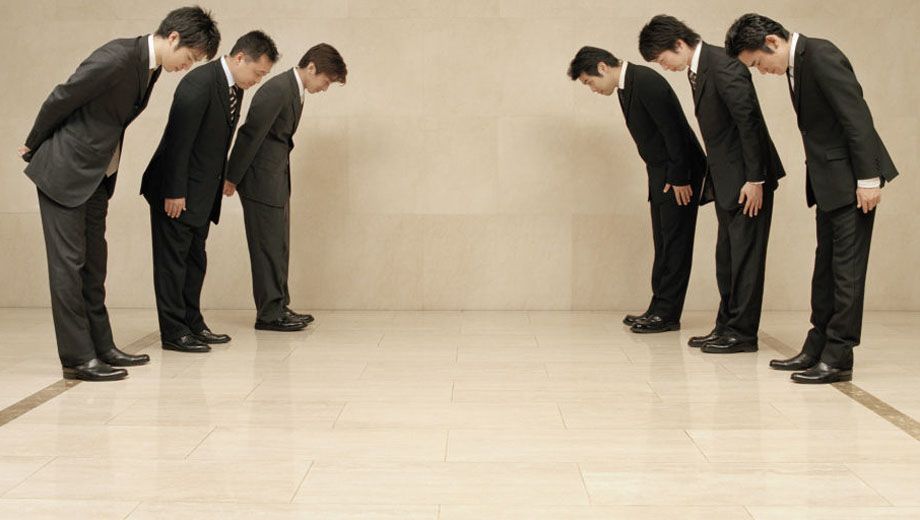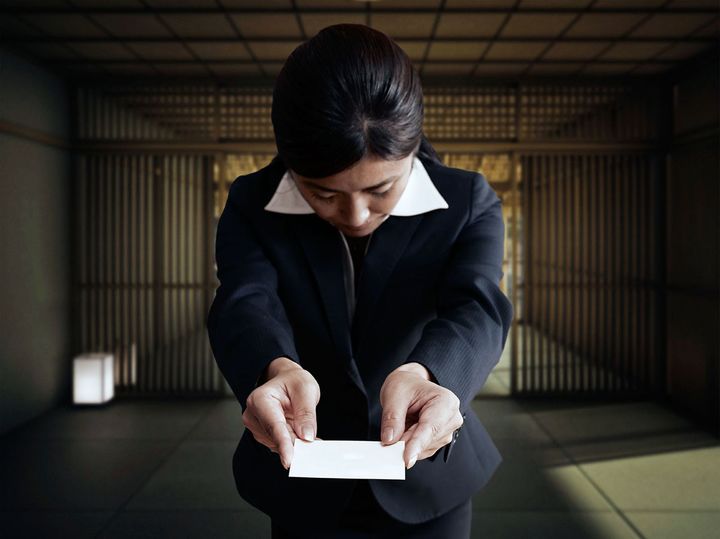Japan is big for business being home to many of the world’s major manufacturers of electronics and other consumer goods, but the office and day-to-day customs you’ll encounter on any business trip here are vastly different from those in Australia and even in many other Asian countries.
Arrive prepared you’ll be seen as having done your research – and when so much of Japanese business is based on respect and trust, proving you have great deal of respect for Japanese culture, and have taken the time to learn about it, will get your business trip off to a good start.
1. Bowing and first impressions
Japanese culture favours bowing in place of a handshake, but relax! Western visitors aren’t expected to know all the rules: these few simple tips will be enough to get you by.
For starters, bows are given with your arms by your sides, a straight back and eyes facing downward, with the length and depth of a bow determining the level of respect being communicated. The longer and deeper it is, the higher the respect.
You’d normally save this kind of bow for the most senior person in the room (determined by both age and company rank), and shorter, shallower bows for the introductions that follow. Shaking hands sometimes occurs but follow the lead of your host and reciprocate gently if a hand is extended.
Complete your great first impression by dressing conservatively – darker business suits of black, grey or navy are of course your best bet, but avoid the combination of a black jacket, plain white shirt and a black tie which the Japanese usually reserve for funerals.
2. Business cards: they’re a big deal
Certainly, most business travellers wouldn’t be seen on the road without a hefty supply of business cards, but in Japan, trading business cards is quite ceremonious: meetings won’t begin until they’ve been exchanged between everybody in the room, so bring spares and plenty of them.
Offer your first card to the most senior person before working your way through the other counterparts in rank order, with the most junior staffer the last to receive a card.
Hold the card with two hands in the two corners closest to you. For extra brownie points, print one side of your card in Japanese and present it Japanese side up. Never slide a card across the table: if you can’t reach somebody, show your respect by standing up and walking over to them.
Accept business cards also with two hands, take time to read each one as you receive it and keep them in rank order with the most senior card on the top. When your meeting concludes, place all cards carefully into a dedicated card holder: never into your pocket or regular wallet.
After cards have been exchanged it’s time to sit. There’s another hierarchy to follow here, so let your host be the one who decides your seat and then sit once others have begun to do so first.
3. Communication: there are protocols
Email, letters and even faxes are all fine, but meetings themselves are best scheduled over the phone, ideally several weeks in advance and don’t typically run late.
You’ll also want to avoid extended eye contact when greetings and then meetings take place – in fact, don’t be surprised if some attendees sit with their eyes closed: unlike in Australia where the mind would be elsewhere, it usually means your Japanese audience is listening very intently.
When you’re the audience, make plenty of written notes during a presentation and stay quiet for the most part, but an occasional interjection to clarify something is welcome and shows you’re actually paying attention, not merely scribbling to give the same appearance.
You’re also expected to address everybody by their surname – never their first name unless invited – and to append ‘san’ (rhymes with ‘barn’) at the end regardless of gender. For example, a Mr Yuki Takahashi would be ‘Takahashi san’, as would a lady with the same surname.
4. Negotiations: yes means no
When negotiating with Japanese clients or suppliers, a lot of what is said is never actually said at all.
If something isn’t agreeable, it’s rare to hear the word ‘no’ during negotiations: instead swapped with visual signs like scratching the head or eyebrows, gentle phrases that suggest something might be difficult, inconvenient, under consideration or even understood, or even an insincere ‘yes’.
Asking “do you disagree with this?” is a great way to clear any confusion and get an honest answer as sentence allows your counterpart to form a ‘positive’ response to the question, while still communicating what needs to be said.
Also avoid the common negotiation tactic of starting high and then coming down: the Japanese expect your best offer up-front, will make decisions in a group and may take several weeks to give a final word. Trust is key, and if a small order is placed to test this, excel in every way you can.
5. Gifts are great
The customs for business gifts in Japan are broadly the same as across Asia: it’s common for the most senior people on each side to exchange them at the end of the first meeting, and for milestones and major holidays thereafter.
But unlike in China, red wrapping in Japan has another funeral connotation – as do lilies, lotus blossoms and camellias – while the numbers four and nine are unlucky, so avoid giving anything in these quantities.
Edibles are the safest bets, especially those that nourish the sweet tooth like chocolates and cakes, and you’ll leave your meeting on a high note if your gift is wrapped elegantly and any gift you might receive is later opened privately.
Also read: 8 secrets to doing business in China
Follow Australian Business Traveller on Twitter: we're @AusBT



30 Aug 2013
Total posts 435
Great article! Its certainly complicated isnt it? I do disagree about avoiding wearing plain black suits with plain white shirt and a black tie - when I've been in Tokyo I noticed almost every male wearing this exact combination. They all lok identical.
08 Mar 2012
Total posts 26
It's the black tie with the black suit and plain white shirt that is associated with funerals. If it was any other color tie with black suit and white shirt then you will fit right in for business ;)
19 Feb 2016
Total posts 1
This is obviously utter nonsense. There is a very good reason that Japan lists so low in terms of labor productivity. This is due to what is endearingly known as TJO, or Typical Japanese Operation. If you want to operate successfully within the market here are some other points that you may wish to consider:
Qantas - Qantas Frequent Flyer
11 Jun 2015
Total posts 2
Utter nonsense.
30 Aug 2013
Total posts 435
Ummm, okay....
Qantas - Qantas Frequent Flyer
28 Aug 2014
Total posts 214
Probably a rule violation, but...
Qantas - Qantas Frequent Flyer GOLD
15 Sep 2015
Total posts 13
On the point of negotiation, Japanese culture certainly does make it hard for people to say no. I've experienced asking for something and having the person tell me they will check only to have them never return! I found it helpful to ask open questions that have a positive option to answer, "should we do A or B" instead of "can we do A".
Hi Guest, join in the discussion on Five tips for doing business in Japan